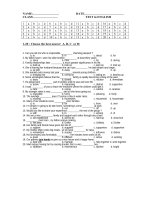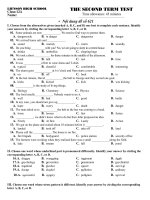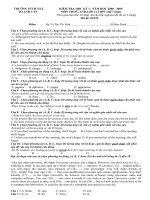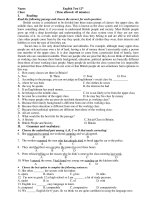TRIAL TEST 12
Bạn đang xem bản rút gọn của tài liệu. Xem và tải ngay bản đầy đủ của tài liệu tại đây (79.83 KB, 3 trang )
<span class='text_page_counter'>(1)</span><div class='page_container' data-page=1>
<b>THANH HOA high school</b> <b>THE TRIAL TEST FOR THE GCSE EXAM </b>
<b>Class: 12</b> <b>Time: 60 minutes</b>
<b>Name:</b> <b>Date:</b>
<b>No 12</b>
<i><b>Mark the letter A, B, C, or D on your answer sheet to indicate the word whose underlined part is</b></i>
<i><b>pronounced differently from that of the rest in each of the following questions.</b></i>
<b>1: </b>A. book B. good C. flood D. look
<b>2: </b>A. whether B. whenever C. whale D. whose
<b>3:</b> A. north B. thank C. think D. whether
<i><b>Mark the letter A, B, C, or D on your answer sheet to indicate the word whose primary stress</b></i>
<i><b>differs from that of the rest in each of the following questions.</b></i>
<b>4: </b>A. company B. history C. disappear D. influence
<b>5:</b> A. destroy B. explore C. remain D. travel
<i><b>Mark the letter A, B, C, or D on your answer sheet to indicate the correct answer to each of the</b></i>
<i><b>following questions.</b></i>
<b>6:</b> Some people are pessimistic ……….. others are optimistic.
A. as B. so C. unless D. while
<b>Question 7:</b> I cannot remember if I saw that play on ……….. television or at the cinema.
A. ∅ B. the C. a D. an
<b>8:</b> ……….. I moved to my new apartment, my neighbors have come to my house twice.
A. Because B. Since C. When D. After
<b>9:</b> We cannot imagine ……….. life would be like without music.
A. what B. when C. where D. how
<b>10:</b> We ……….. for an hour when the bus finally came.
A. waited B. have waited C. have been waiting D. had been waiting
<b>11:</b> If John ……….. an alarm, the thieves wouldn’t have broken into his house.
A. to install B. had installed C. have installed D. was installed
<b>12:</b> The windows are dirty. They need ……….. .
A. be wash B. to wash C. being washed D. washing
<b>13:</b> The movie itself wasn’t very good, ……….. I liked the music.
A. and B. or C. but D. so
<b>14</b>: Many people die ……….. cancer.
A. by B. with C. for D. of
<b>15</b>: SCHOOL NOTICE: The lifts ……….. be used in case of fire.
A. must B. mustn’t C. need D. needn’t
<b>16</b>: Did you read ……….. book I lent you ……….. last week?
A. the - ∅ B. the - the C. a - the D. a - a
<b>17</b>: We don’t know ……….. that machine.
A. use B. to use C. using D. how to use
<b>18: </b>I think it ……….. , but I’m not sure at all.
A. might rain B. can rain C. needn’t rain D. mustn’t rain
<b>19: </b>The ……….. of species extinction is human intervention.
A. cause B. fact C. aim D. result
<b>20:</b> Rhinos are in the Red List. There are only a few leftin the wild.We call them ……….. animals.
A. danger B. endanger C. endangered D. dangerous
<b>21: </b>Francis Bacon, lived at about the time of Shakespeare, wrote this book.
A. who B. whom C. that D. he
<b>22: </b>Some people think more and more people have television in their homes, ………. people will buy
books to read.
A. few and few B. fewer and fewer C. much and much D. more and more
</div>
<span class='text_page_counter'>(2)</span><div class='page_container' data-page=2>
A. if B. because C. unless D. as if
<b>24: </b>This desert lies between a lake …………. a range of mountain.
A. with B. and C. away D. of
<b>25: </b>The desert remained unknown ……… he made a survey in 1929.
A. but B. although C. so that D. until
<b>26: </b>He names the desert .…… Simpson.
A. after B. by C. to D. with
<b>27: </b>……… the computers and robots, we will have a better future life.
A. Instead of B. In spite of C. As a result D. Thanks to
<b>28:</b> Many species become ……… each year.
A. , extinct B. extinctly C. extinction D. extinguish
<b>29: </b>We benefit much ……… biodiversity.
A. from B. for C. of D. to
<b>30: </b>This library belongs ……… a rich old man.
A. about B. in C. to D. with
<i><b>Mark the letter A, B, C or D on your answer sheet to show the underlined part that needs </b></i>
<i><b>correction.</b></i>
<b>31: </b>George has not completed the assignment yet, and Maria hasn’t, neither.
A B C D
<b>32: </b>I’m afraid I can’t come with you on tomorrow.
A B C D
<b>33: </b>After Tom returned to his house, he read a book.
A B C D
<b>34: </b>What would happen if the temperature is warmer?
A B C D
<b>35: </b>My friend and I were tired, but we went home early.
A B C D
<i><b>Read the following passage and mark the letter A, B, C or D on your answer sheet to indicate</b></i>
<i><b>the correct word for each of the blanks from 36 to 40.</b></i>
It is <b>(36) ……..</b> to know how many elephants once lived in the continent, but there may have
been <b>(37) ……..</b> 3-5 million elephants in Africa in the early part of the 20th<sub> century. People have always</sub>
hunted elephants for meat, hides, and ivory. As the human population grew and weapons became
more advanced, elephants were under greater threat. In the late 1970s and early 1980s there was a
huge <b>(38) ……..</b> in the number of elephants due to the increase in poaching. It is estimated that there
are now about 500,000 elephants and they are living in <b>(39) ……..</b> countries. A ban was given on all
international trade in ivory in 1989, and many governments started to give poachers severe
punishments. Thanks to such timely actions, some elephant populations, especially those in southern
Africa, have <b>(40) ……..</b> over the last decade. However, numerous threats remain for Africa’s elephants.
<b>36: </b>A. able B. difficult C. easy D. uncomfortable
<b>37: </b>A. at least B. by far C. for sure D. of course
<b>38: </b>A. decline B. growth C. increase D. reduce
<b>39: </b>A. a large amount of B. a great deal of C. a little sum of D. a small number of
<b>40: </b>A. recover B. to recover C. recovering D. recovered
<i><b>Read the following passage and mark the letter A, B, C, or D on your answer sheet to indicate</b></i>
<i><b>the correct answer to each of the questions from 41 to 45.</b></i>
</div>
<span class='text_page_counter'>(3)</span><div class='page_container' data-page=3>
Cambridge was already developing town long before the first students and teachers arrived 800
years ago. It grew up by the river Granta, as the Cam was once called. A bridge was built over the river
as early as 875.
In the fourteenth and fifteenth centuries more and more land was used for college buildings. The
town grew much faster in the nineteenth century after the opening of the railway in 1845. Cambridge
became a city in 1951 and now it has the population of over 100,000. Many young students want to
study at Cambridge. Thousands of people from all over the world come to visit the university town. It
has become a famous place all round the world.
<b>Question 41: </b>Why do most visitors come to Cambridge?
A. To see the university B. To study in the colleges in Cambridge
C. To find the classroom buildings D. To use the libraries of the university
<b>42: </b>Around what time did the university begin to appear?
A. In the 8th<sub> century</sub> <sub>B. In the 13</sub>th<sub> century</sub>
C. In the 9th<sub> century</sub> <sub>D. In the 15</sub>th<sub> century</sub>
<b>43: </b>Why did people name Cambridge the “City of Cambridge”?
A. Because the river was very well-known B. Because there is a bridge over the Cam
C. Because it was a developing town D. Because there is a river named Granta
<b>44: </b>After which year did the town really begin developing?
A. 800 B. 875 C. 1845 D. 1945
<b>45: </b>From what we read, we know that Cambridge is now ……….. .
A. visited by international tourists B. a city without wall
C. a city that may have a wall around it D. a city of growing population
<i><b>Mark the letter A, B, C or D on your answer sheet to indicate the correct answer to each of the</b></i>
<i><b>following questions.</b></i>
<b>46.</b> You shouldn’t tell her the news. It might kill her.
A. The news shouldn’t be told her. It might kill her.
B. The news shouldn’t be told her. She might be killed.
C. She shouldn’t be told the news. It might kill her.
D. She shouldn’t be told the news. She might be killed.
<b>47.</b> Maintaining biodiversity is important for us in many ways.
A. It is important for us to maintain biodiversity in many ways.
B. It is important maintain biodiversity for us in many ways.
C. It is important maintained biodiversity in many ways for us.
D. It is important maintaining biodiversity in many ways for us.
<b>48.</b> In spite of the cold water, I went swimming anyway.
A. Despite the water was cold, I went swimming anyway.
B. Although the water was cold, I went swimming anyway.
C. Though the cold water, I went swimming anyway.
D. The water was cold, so I went swimming anyway.
<b>49.</b> Peter doesn’t read a lot because he can’t find the time.
A. If Peter could find the time, he would read a lot.
B. If Peter can find the time, he will read a lot.
C. If Peter had found the time, he would have read a lot.
D. If Peter had read a lot, he would have found the time.
<b>50.</b> “If I were you I would stay in bed, Sue,” said Tom.
A. Tom said that if he had been Sue he would have stayed in bed.
B. Tom told Sue if he had been her, he would have stayed in bed.
C. Tom advised Sue to stay in bed.
D. Tom said to Sue if he is her he will stay in bed.
</div>
<!--links-->









